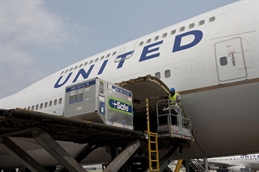
After a tough slog through a seemingly endless downturn, the industry’s fortunes have improved markedly recently. The peak season saw demand climb faster than capacity, reversing a long trend, and falling oil prices have eased the pressure on airlines’ costs. Nevertheless Jan Krems, president of United Cargo, finds that a lot has to be done to put carriers’ fortunes firmly in the ascent again.
“Yields are still in decline,” he pointed out.
The only way to arrest the downward trend of yields for a carrier is to move more aggressively into added value services, he concluded.
Like several other airlines, United has ramped up its capabilities to attract pharmaceuticals traffic to its network. Last September it became the first US carrier to add the Envirotainer RKN e1 container to its line-up of ULDs with active temperature-control capabilities. At the same time, the number of stations that are certified to handle temperature-sensitive cargo has been pushed up, reaching 49 points in the airline’s worldwide network in December.
In a flanking measure, United has also increased the number of devices that can be used for tracking and monitoring of climate conditions inside containers or in the bellyholds of its planes.
Pharmaceuticals are but one business segment where Krems senses promising opportunities for United. A host of special service options are under scrutiny at this point. “We look at garments on hangers, at art, valuables, high-end perishables, high-end cars, at the aerospace industry. There are so many possibilities that I feel we should move into,” he reflected.
Krems can draw on a rich seam of experience at KLM Cargo (subsequently Air France-KLM Cargo), where he worked for nearly 30 years before taking their reins at United Cargo last year. “We did a lot with special products at KLM. These produced higher rates, which meant we were stronger in a downturn,” he recalled.
Rather than rush headlong in a dozen directions simultaneously, he prefers a phased approach. “It will be segment-by-segment. If we can do things simultaneously, we will do that, but we have to prioritize, not do all in one go. I prefer to do it in the right way, and if that takes a bit longer, that is okay,” he said.
Starting with existing offerings, he sees further possibilities to strengthen United’s position in the temperature control. After that he has his sights on the express segment. United’s PetSafe programme, which was largely developed by Continental cargo prior to the merger with United, offers promising opportunities to grow further, he added.
“We now move over 100,000 pets a year. We want to take this product to the next level,” he said.
Krems’ focus on special products to elevate yields suggests that his initial priority with fixing problems is drawing near an end. He inherited an organization that was struggling to digest some far-reaching changes, from the integration of the cargo divisions of United and Continental to the implementation of a new IT platform alongside a new revenue accounting system.
“United had a tough 18 months to go through, but things are coming together now,” he remarked, adding that the issues that bugged the IT set-up in the early stage have been largely resolved.
Another theme on the agenda has been to improve the flow of communication between different departments. “The different silos were not talking to each other,” he recalled. “We have to make sure there is good connectivity, that the communication between the parts is stronger,” Krems said.
One critical element there is the connectivity between sales and customer service. The ultimate objective there is to strengthen the way how the carrier deals with its strategic partners, he noted.
Beyond his own organization, he will have to look at the possibilities that antitrust immunity for a joint venture with All Nippon Airways Cargo offers. The Japanese carrier has indicated that it expects the partnership with its US partner to unfold along similar lines as its new venture with Lufthansa Cargo announced a few months earlier, which stresses joint commercial activities above all else.
With so much else on his plate, it is not surprising that Krems sounds less determined on where the new alliance will take the two carriers. According to him, it is very much open at this point where the journey will go. “We look where we can grow together,” he commented. “We do not want to move too fast, not take too big steps in the early stage.”
By Ian Putzger
Air Freight Correspondent | Toronto



